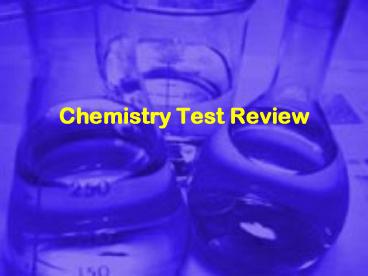Chemistry Test Review - PowerPoint PPT Presentation
1 / 21
Title: Chemistry Test Review
1
Chemistry Test Review
2
Your test will be
- 10 short answer questions
- Each question is worth 10 points each
- Partial credit will be given
3
Hints for doing well on this test
- Read each question carefully
- Answer the question you are asked
- Re-read each answer
- Make sure you have answered the question
completely - Make sure your answer relates to the question
4
Example Questions
- And how to answer them
5
One of your friends stays overnight at your
house. The next morning, your mother cooks him
some fried eggs for breakfast. He says, "I don't
like fried eggs, can you change them to poached
eggs instead?"
- Use what you know about physical and chemical
changes to explain why it is NOT possible to
change the fried eggs to poached eggs.
6
You MUST discuss changes why in your answer
- It is not possible to change the fried eggs into
poached eggs because cooking eggs is a chemical
change - Chemical changes produce new products that are
very difficult to reverse
- Answer identifies cooking an egg as a chemical
change - Answer describes chemical changes as being
difficult to reverse because the original
substance is changed into a new substance
7
Scientists used to think electrons moved in
orbits around the nucleus.
- How do scientists currently describe the movement
of electrons?
8
Notice the word movement the question is not
asking about location only
- Electrons move in an electron cloud around the
outside of the nucleus - The electrons do not follow a particular path
9
Oxygen gas normally exists as O2 molecules. Each
molecule contains two oxygen atoms.
- Is O2 a compound? Explain your answer.
10
Make sure you EXPLAIN
- No answer
- A compound must contain atoms from more than one
element explanation
11
Why is the state of matter a physical property
and not a chemical property?
12
You must know the meaning of each of these terms
to answer this question
- State of matter
- Physical property
- Chemical property
13
Sometimes giving an example helps explain your
thinking
- Changing state does not change the identity of
the matter. - Chemical properties can't be observed without
changing the substance. - Water is still water whether it is ice, liquid,
or vapor. example
14
Vanadium, with an atomic number of 23, and
bromine, with an atomic number of 35, are both in
the same period as germanium.
- Explain why bromine is most likely a
non-metal. - Explain why vanadium is most likely a metal.
15
- Vanadium is most likely a metal because it on the
left side of the same period
- Bromine is most likely a non-metal because it is
to on right side of the same period.
16
The operating system and programs that run on a
computer depend on tiny electrical circuit boards
called chips, which are made of materials called
semi-conductors.
- Based on the label "semi-conductor," which type
of element would you predict is used to make
computer chips? Explain.
17
Semi-Conductors
- Metalloids because their ability to conduct
electricity lies somewhere between the good
metallic conductors and the poor nonmetallic
conductors.
18
In the fall, you rake leaves into a pile, burn
them, and spread the ashes back on the lawn as
fertilizer.
- What are the chemical changes and what are the
physical changes in this process?
19
Think about each part of the question
- Raking the leaves into a pile and spreading the
ashes are physical changes.
- Burning the leaves and the ashes being broken
down by the lawn for fertilizer are chemical
changes.
20
Define the law of conservation of mass and
explain how it relates to physical and chemical
changes.
21
2 Parts to this question
- Definition
- The law of conservation of mass states that mass
cannot be created or destroyed.
- Explanation
- This means that the mass of any substances
present before a physical or chemical change is
equal to the mass of the substances present after
the change.





![[PDF] Princeton Review MCAT Subject Review Complete Box Set, 4th Edition: 7 Complete Books + 3 Online Practice Tests (Graduate School Test Preparation) Ipad PowerPoint PPT Presentation](https://s3.amazonaws.com/images.powershow.com/10087792.th0.jpg?_=20240729067)

























